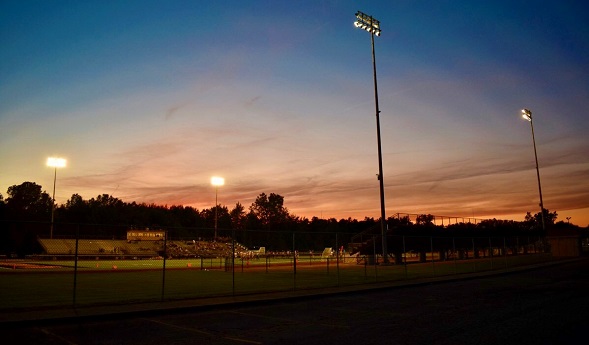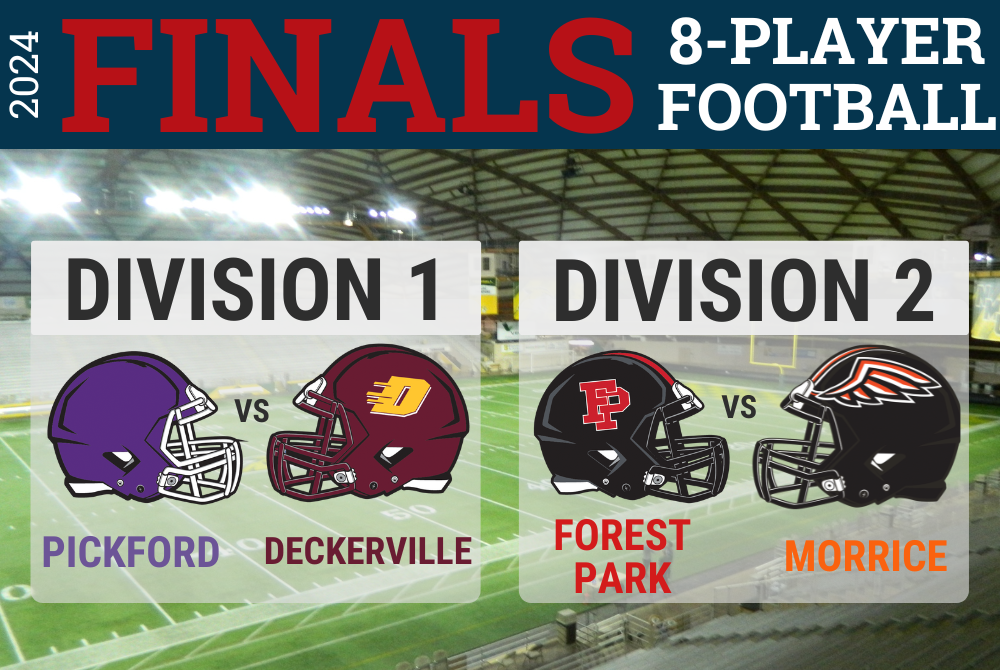
Football to Move to Spring for 2020-21
August 14, 2020
By Geoff Kimmerly
Second Half editor
The Representative Council of the Michigan High School Athletic Association today announced it will move the 2020 Fall football season to Spring 2021, due to football’s higher risk for spreading COVID-19, with the rest of Fall sports proceeding as scheduled.
The football season switch was made based on consultation with state health department officials and after surveying MHSAA member high schools on their progress and preferences after the first four days of practice. Football is considered a high-risk sport for potential spread of the COVID-19 virus because of its level of player-to-player contact.
A total of 34,219 student-athletes played football at MHSAA member schools during the 2019 season. A total of 520 11-player teams and 83 8-player teams were anticipated during late summer to play football this fall season.
“At the end of the day, we did everything we could to find a path forward for football this fall,” MHSAA Executive Director Mark Uyl said. “But while continuing to connect with the Governor’s office, state health department officials, our member schools’ personnel and the Council, there is just too much uncertainty and too many unknowns to play football this fall.
“No one is willing to take the risk of COVID being passed on because of a high-risk sport. Decisions have to be made on our other sports as well, but none of those carry the same close, consistent, and face-to-face contact as football.”
The MHSAA announced July 17 it would proceed this school year with its traditional calendar beginning with Fall sports but with enhanced precautions to help limit the spread of COVID-19. At that time, the MHSAA also stated it would move football, and other Fall sports seasons, to the spring of 2021 if they were deemed unsafe to proceed when originally scheduled. Football was allowed to begin practice, with helmets but no other padding, on Aug. 10.
Volleyball and soccer are considered moderate-risk for virus spread, while cross country, golf, tennis and swimming & diving are considered low-risk. Cross Country, Lower Peninsula girls golf and boys tennis and Upper Peninsula girls tennis began practice Aug. 12; golf and tennis teams may begin competing Aug. 19, and cross country teams may begin competing Aug. 21.
Volleyball, boys soccer and Lower Peninsula girls swimming & diving also began practice Aug. 12, and competition guidelines for those sports will be announced Aug. 19. Schools in regions under Phase 4 of the MI Safe Start Plan remain unable to play volleyball or swim/dive indoors due to governmental restrictions. Further guidance from Governor Gretchen Whitmer’s office is expected in the near future regarding these indoor facilities.
Details for the spring football season including a specific schedule and format will be announced over the next few months. The MHSAA will be working to limit overlap of spring football and the traditional Spring sport seasons.
“While this is tremendously disappointing, we will do everything possible to provide the best possible experience in the spring while adding football into the calendar,” Uyl said.
The MHSAA is a private, not-for-profit corporation of voluntary membership by more than 1,500 public and private senior high schools and junior high/middle schools which exists to develop common rules for athletic eligibility and competition. No government funds or tax dollars support the MHSAA, which was the first such association nationally to not accept membership dues or tournament entry fees from schools. Member schools which enforce these rules are permitted to participate in MHSAA tournaments, which attract more than 1.4 million spectators each year.
PHOTO by Robert Batzloff.

1st & Goal: 2024 8-Player Finals Preview
By
Geoff Kimmerly
MHSAA.com senior editor
November 22, 2024
For the first time since 8-player football was split into two divisions in 2017, all four teams playing in this season’s MHSAA Finals are past champions.
 Deckerville and Pickford in Division 1, and Crystal Falls Forest Park and Morrice in Division 2 have all won one title during the first 13 years of 8-player playoffs. All four also are making their first championship appearances this decade.
Deckerville and Pickford in Division 1, and Crystal Falls Forest Park and Morrice in Division 2 have all won one title during the first 13 years of 8-player playoffs. All four also are making their first championship appearances this decade.
Deckerville and Pickford kick off at 11 a.m. Saturday at Northern Michigan University’s Superior Dome, and Morrice and Crystal Falls Forest Park follow at 2 p.m. Tickets cost $10 and are good for both games, and may be purchased online through NMU or at the door – click for details. Both games will be broadcast live on MHSAA.tv, and audio of both games will be streamed live on MHSAANetwork.com.
Below is a look at all four finalists:
Division 1
DECKERVILLE
Record/Rank: 12-0, No. 1
Coach: Bill Brown, 32nd season (258-90)
League finish: First in Big Thumb Conference Blue
Championship history: 8-player (single division) champion 2012, two runner-up finishes.
Best wins: 49-32 over No. 7 Mendon in Semifinal, 40-6 (Regional Final) and 44-0 over No. 8 Kingston, 54-34 (Regional Semifinal) and 50-16 over Bay City All Saints, 50-42 over No. 2 Alcona, 30-28 over Brown City.
Players to watch: QB Hunter Garza, 6-1 sr. (1,488 yards/26 TDs rushing, 804 yards/10 TDs passing); SE/DB Ian Flanagan, 6-1 jr. (230 yards/3 TDs receiving); RB/DB Parker Merriman, 5-10 sr. (1,003 yards/14 TDs rushing); RG/DE Preston Holman, 6-1 sr. (Weights not provided. Statistics through Regional Final.)
Outlook: Deckerville will be playing in its first championship game since finishing runner-up in both 2016 (single division) and 2017 (Division 1), and after reaching the Semifinals a year ago. Alcona and Brown City were the only opponents to get within 17 points of the Eagles this fall. There are only seven seniors, but they combine to fill seven of the 16 starting spots. Holman made the all-state second team last season, and Garza earned an honorable mention.
PICKFORD
Record/Rank: 12-0, No. 3
Coach: Josh Rader, 21st season (153-66)
League finish: First in Great Lakes Eight Conference East
Championship history: Division 2 champion 2019, Division 1 runner-up 2018.
Best wins: 34-18 over No. 5 Indian River Inland Lakes in Semifinal, 44-6 (Regional Final) and 65-14 over No. 10 Ishpeming, 51-6 over Norway, 40-12 over Division 2 No. 6 Powers North Central.
Players to watch: QB/DE Tommy Storey, 5-9/175 sr. (1,656 yards/28 TDs passing, 954 yards/16 TDs rushing); RB/DB Gunner Bennin, 6-0/165 jr. (828 yards/19 TDs rushing, 386 yards/8 TDs receiving); TE/DE Ian Browne, 6-3/175 sr. (206 yards/4 TDs receiving); OG/DT Haydn Rader, 6-1/210 sr.
Outlook: Storey is a returning all-state first-teamer who also quarterbacked the team to the Semifinals a year ago. He leads an attack that’s rushed for 3,768 yards – at more than 10 a carry – but can keep defenses honest with a passing game as well. In addition to being the team’s second-leading rusher and leading receiver, Bennin has a team-high four interceptions and has also scored on defense and as a kick and punt returner. Haydn Rader made the all-state second team last season and with Storey, Browne and Bennin is among eight players who start on both sides of the ball.
Division 2
CRYSTAL FALLS FOREST PARK
Record/Rank: 11-1, No. 3
Coach: Brian Fabbri, fifth season (35-11)
League finish: Second in Great Lakes Eight Conference West
Championship history: Division 2 champion 2017, three MHSAA titles and 10 runner-up finishes in 11-player.
Best wins: 34-12 over No. 6 Powers North Central in Regional Final, 49-24 over No. 8 Onekama in Semifinal, 42-20 over Norway.
Players to watch: RB/DB Dax Huuki, 6-0/175 soph. (1,424 yards/20 TDs rushing); QB/DB Vic Giuliani, 6-2/165 soph. (908 yards/14 TDs passing, 7 TDs rushing); RB/DE Grayson Sundell, 6-1/190 sr. (899 yards/17 TDs rushing); TE/DT Kevin Giuliani, 6-5/270 sr. (277 yards/6 TDs receiving).
Outlook: Forest Park will play in its first championship game since its title-winning season in 2017 and picked up major steam with its Regional Final win over rival North Central, which avenged a 45-34 league title-deciding loss from Week 9. No other opponent got within 20 points of the Trojans this season. Kevin Giuliani made the all-state second team last season and is one of seven two-way starters. Junior Trent Kannich is another and has 406 yards and seven touchdowns rushing and a team-high 364 yards receiving from his fullback spot. Senior linebacker Brody Starr has five interceptions and has returned two for touchdowns, and senior linebacker Nik Stephens has four picks and one for a score.
MORRICE
Record/Rank: 11-1, No. 5
Coach: Kendall Crockett, 11th season (96-25)
League finish: Tied for first in Mid-State Activities Conference Red
Championship history: Division 1 champion 2018.
Best wins: 36-0 over No. 4 Britton Deerfield in Semifinal, 46-14 (Regional Final) and 38-6 over Mount Pleasant Sacred Heart, 28-22 over No. 7 Portland St. Patrick in Regional Semifinal, 22-0 over Fulton.
Players to watch: RB/DB Joel Fisher, 5-7/139 sr. (1,687 yards, 19 TDs rushing); WR/DB Wyatt Valentine, 5-10/163 soph. (50 tackles, 10 interceptions); RB/OLB Wyatt Cartier, 5-7/150 sr. (1,468 yards, 27 TDs rushing), OG/DE Travis Smith, 6-0/215 sr.
Outlook: Morrice also avenged its lone regular-season loss to advance this postseason, having lost to St. Patrick 29-12 in Week 4 before opening the playoffs with a win over the Shamrocks. Fisher and Cartier are a dynamite 1-2 punch in the backfield, and Fisher made the all-state second team last season. Smith earned an honorable mention in 2023 and is joined on both lines by 6-foot-3, 215-pound junior Oliver Long, who has 12 sacks. Junior linebacker Austin Gutting is the leading tackler for a defense giving up only 10 points per game.
MHSAA.com's weekly “1st & Goal” previews and reviews are powered by MI Student Aid, a division within the Department of Lifelong Education, Advancement, and Potential (MiLEAP). MI Student Aid encourages students to pursue postsecondary education by providing access to student financial resources and information. MI Student Aid administers the state’s scholarship and grant programs that help make college Accessible, Affordable and Attainable for you. Click to connect with MI Student Aid and find more information on Facebook and Twitter @mistudentaid.

